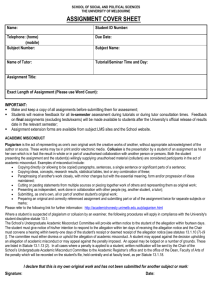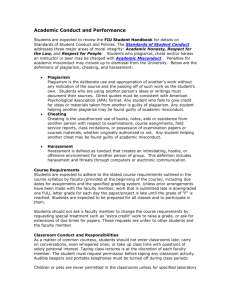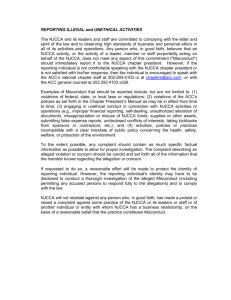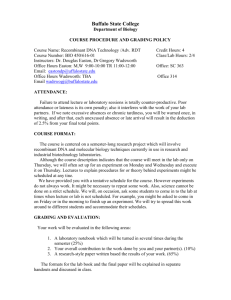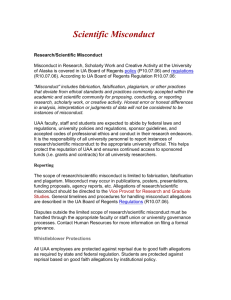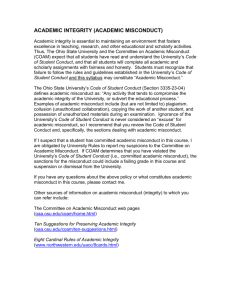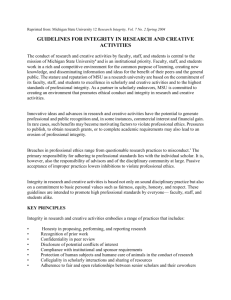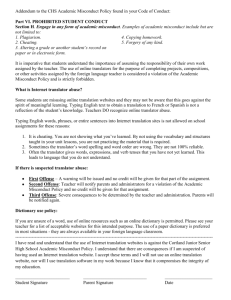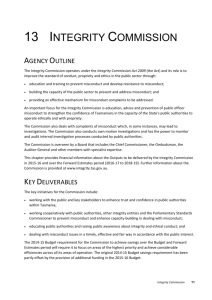Academic Integrity Transcript
advertisement
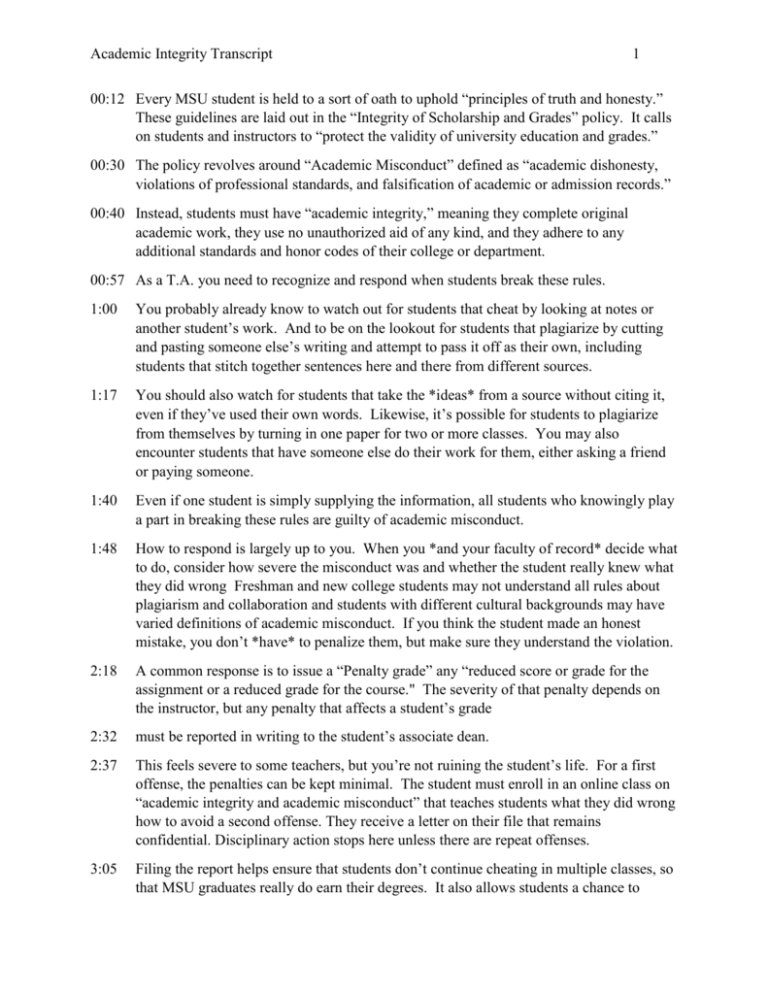
Academic Integrity Transcript 1 00:12 Every MSU student is held to a sort of oath to uphold “principles of truth and honesty.” These guidelines are laid out in the “Integrity of Scholarship and Grades” policy. It calls on students and instructors to “protect the validity of university education and grades.” 00:30 The policy revolves around “Academic Misconduct” defined as “academic dishonesty, violations of professional standards, and falsification of academic or admission records.” 00:40 Instead, students must have “academic integrity,” meaning they complete original academic work, they use no unauthorized aid of any kind, and they adhere to any additional standards and honor codes of their college or department. 00:57 As a T.A. you need to recognize and respond when students break these rules. 1:00 You probably already know to watch out for students that cheat by looking at notes or another student’s work. And to be on the lookout for students that plagiarize by cutting and pasting someone else’s writing and attempt to pass it off as their own, including students that stitch together sentences here and there from different sources. 1:17 You should also watch for students that take the *ideas* from a source without citing it, even if they’ve used their own words. Likewise, it’s possible for students to plagiarize from themselves by turning in one paper for two or more classes. You may also encounter students that have someone else do their work for them, either asking a friend or paying someone. 1:40 Even if one student is simply supplying the information, all students who knowingly play a part in breaking these rules are guilty of academic misconduct. 1:48 How to respond is largely up to you. When you *and your faculty of record* decide what to do, consider how severe the misconduct was and whether the student really knew what they did wrong Freshman and new college students may not understand all rules about plagiarism and collaboration and students with different cultural backgrounds may have varied definitions of academic misconduct. If you think the student made an honest mistake, you don’t *have* to penalize them, but make sure they understand the violation. 2:18 A common response is to issue a “Penalty grade” any “reduced score or grade for the assignment or a reduced grade for the course." The severity of that penalty depends on the instructor, but any penalty that affects a student’s grade 2:32 must be reported in writing to the student’s associate dean. 2:37 This feels severe to some teachers, but you’re not ruining the student’s life. For a first offense, the penalties can be kept minimal. The student must enroll in an online class on “academic integrity and academic misconduct” that teaches students what they did wrong how to avoid a second offense. They receive a letter on their file that remains confidential. Disciplinary action stops here unless there are repeat offenses. 3:05 Filing the report helps ensure that students don’t continue cheating in multiple classes, so that MSU graduates really do earn their degrees. It also allows students a chance to Academic Integrity Transcript 2 defend themselves if they’ve been falsely accused. Students can officially grieve any written allegation of misconduct. If it’s brought before a hearing board, it will be up to you to provide reasonable proof, so make sure to keep good records. 3:30 In practice, a written report means going to the Instructor System’s menu on the registrar’s website. Scroll down, to see “Academic Dishonesty Report.” If you see an alert saying you don’t have access, your faculty of record will have to fill it out for you. You’ll provide the type of misconduct, the penalty you issued, and a brief description of the misconduct. If the penalty grade was a failing grade for the course, you can also request more severe penalties such as removal from their program. 3:55 MSU Policy asks instructors to “exercise care in planning and supervising academic work" in order to preserve academic integrity. Think about what you can do to make misconduct a rare occurrence. 4:10 A good start is putting MSU’s policies right on your syllabus, and then making sure your students understand them. When possible, have a proctor there during tests and quizzes or consider altering questions slightly for each test. This could be as simple as changing the order of questions. 4:25 For written assignments, many teachers try to create assignment prompts that discourage plagiarism. Some strive for unique assignments that are hard to plagiarize, while others teachers think open ended prompts help students have a personal interest in their topic, making them less likely to plagiarize. Whatever your approach, the point is to be mindful of your teaching habits. 4:45 As you encounter various types of academic misconduct and any troubling gray areas, remember that you can rely on your own judgment, that your faculty of record can advise you based on their own experience, and that you can always find more information about academic integrity from the office of the ombudsperson and the links on this site.

